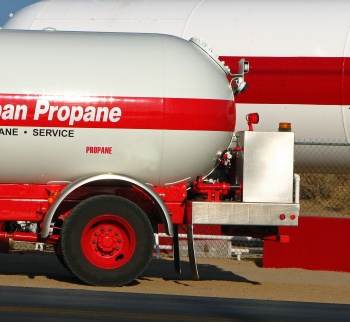Truckers get HOS waivers to deal with propane shortage
Unusually heavy rains in the Midwest this year have left cornfields soggier than usual, creating a shortage of propane used to power the giant, oven-like dryers used to dry the corn before it is stored to prevent rot.
Consequently, governors in Indiana, Iowa, Minnesota, Nebraska, North Dakota, South Dakota, Wisconsin and Montana have issued executive orders waiving Hours of Service rules for truckers transporting propane within those states.
Mark Dayton, governor of Minnesota, cited propane terminal shortages throughout the region, causing drivers to drive to other states to secure propane. Dayton’s executive order pointed to long lines at terminals and extensive driving distances as reasons for the emergency measure to allow drivers to exceed Hours of Service rules.
New HOS rules that went into effect in July limit drivers to about 70 hours of driving per week, down from 82 hours. In addition, new rest requirements limit how much they can drive in the small hours of the morning, when roads are relatively empty.
The propane shortage is keeping farmers from finishing this year’s corn harvest because they have no way to quickly dry their crops. About 75 percent of the U.S. harvest has been completed, behind the historical average of 71 percent for this time of year, according to the U.S. Department of Agriculture (USDA).
The need for propane is most acute from North Dakota to Wisconsin because the upper Midwest has received six times the normal precipitation in the past month.
Due to the shortage, propane prices have soared to an 18-month high, reaching $1.17 per gallon, up from $1.00 a year ago. Propane, which is made from processing crude oil and natural gas, is used to heat 10 percent of U.S. homes.
Stockpiles of propane in the Midwest dropped to 23.6 million barrels, down from 27.4 million barrels a year earlier, according to the U.S. Energy Information Administration.
“There is adequate supply of propane in the U.S. The problem is getting it where it’s needed fast enough,” said Roger Leider, executive director of the Minnesota Propane Association, a trade group of more than 180 companies.
Kinder Morgan Inc., which operates about 80,000 miles of pipelines and 180 terminals that handle natural gases, petroleum and crude oil, said shipments of propane through its Cochin pipeline to four western terminals in North Dakota, Minnesota and Iowa more than tripled to 770,058 barrels in October.
“This year everybody planted at the same time, we harvest at the same time, so everybody needed LP at the same time. And, usually there is a little space in between,” says Randy Stephenson of Dexter Elevator Inc. in Minnesota.
“I don’t call it a propane shortage, it’s a transportation problem, and we can’t get it to the right spots that need it quick enough cause there are not enough transport trucks running,” says Stephenson.
Farmers in the Midwest have increased the amount of storage in the past decade and have added dryers to avoid the cost of paying elevator operators to dry the grain, according to Bob Zelenka, executive director of the Minnesota Grain & Feed Association. Zelenka said this year’s shortage is the worst he has seen in 20 years.
The tanks at the state’s 10 propane terminals are mostly empty, meaning trucks are being loaded directly from the pipeline, which takes more time.
A large commercial corn dryer at a grain elevator drying at full capacity will use a semi-load of propane in four hours. For many cooperatives, income derived from commercial grain drying is a significant part of their income stream.
In addition to the shortage of propane, farmers are also battling the calendar. Growers need to harvest their crops before winter conditions set in.
Despite the propane shortage, experts are predicting the U.S. corn harvest to be the biggest ever, producing a yield of roughly 14 billion bushels, a 30 percent increase from the 2012 harvest.
Growers have cited agreeable weather, a far cry from the drought conditions of 2012.
Fueling the demand for more corn crops is the Environmental Protection Agency’s renewable fuel mandate requiring biofuels be blended into gasoline. The mandate was created under the Energy Policy Act of 2005 and substantially expanded in 2010.






